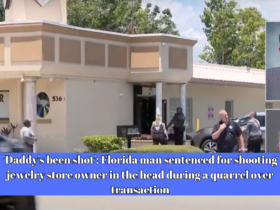A jury in New York City cleared Daniel Penny, 26, of the 2023 death of Jordan Neely, a homeless man with mental health issues, whom Penny choked for nearly six minutes during a tense encounter on the subway.
The jury acquitted Penny of criminally negligent homicide in Neely’s death. The jury dropped a more serious manslaughter charge earlier in the proceedings due to a deadlock on that matter. Both charges were felonies, with the possibility of prison time.
The courtroom erupted in both applause and anger as they read the not-guilty verdict. CNN reports that the court led Neely’s father out of the room following an “audible outburst with expletives.”
Another person left, wailing in tears.
Penny, who had expressed little emotion throughout the trial, smiled briefly as the verdict was read.
Republican New York City Councilwoman Joann Ariola praised the not-guilty verdict, saying, “Justice has prevailed.”
“Daniel Penny is a hero, and I’m happy to see that a good man was not punished for doing the right thing and defending his fellow New Yorkers from a mentally ill criminal who fell between the cracks,” Ariola told the crowd.
Democratic council member Robert Holden announced the acquittal of Daniel Penny in a statement to X. “A United States Marine who bravely stepped up to protect fellow New Yorkers during a time of crisis has received justice.”
“This outcome highlights the need to focus on real solutions, like addressing untreated mental illness, to prevent future tragedies like this from happening again.”
The verdict, according to City Councilman Yusef Salaam, a member of the Central Park Five wrongfully convicted, was “a searing indictment” of “systemic failures.”
“His killing underscores the urgent and overdue need for a complete overhaul in how we address mental health crises and homelessness,” Salaam told reporters.
Neely’s father said outside court that his son “didn’t have to go through this” in an emotional statement.
“That hurts. It really hurts. What will we do, people? What will happen to us now? I have had enough of this. The system is rigged. Let’s do something about it.
The trial, which started in October, aimed to establish if Penny, an architecture student and Marine Corps veteran, had the right to use potentially fatal force on Neely on May 1, 2023.
Witnesses described Neely, a street performer, entering the subway car and yelling threateningly to passengers that he didn’t have food or water and didn’t care if he ended up in jail. Penny and some of his fellow passengers claimed Neely said he was willing to kill.
Prosecutors contended that Penny’s initial attempt to defend his fellow passengers was understandable and “even laudable,” but that the student went too far and used lethal force without justification. They argued that he continued to choke Neely after some passengers exited the train, and Neely remained motionless for nearly a minute.
“You obviously cannot kill someone because they are crazy, ranting, and looking menacing, regardless of what they are saying,” Manhattan Assistant District Attorney Dafna Yoran told jurors during closing arguments.
Meanwhile, the defense contended that the perceived threat to train passengers justified Penny’s actions.
“Daniel Penny was the one who moved to protect them,” defense attorney Steven Raiser stated in closing arguments. “Why? Because he possessed something that others lacked: “Something unique to him.”
The defense called in a pathologist, who testified that other factors, such as Neely’s use of synthetic marijuana, schizophrenia, and genetic predisposition to sickle cell disease, could have contributed to his death.
Dr. Cynthia Harris, the city medical examiner, testified during the trial that Neely died from “compression of the neck,” and that “no toxicological result imaginable was going to change my opinion.”
The court also heard from a Marine Corps instructor who described Penny’s training with chokehold techniques.
The defense claims Penny attempted to place Neely in a “civilian” hold and wait for police.
During the trial, jurors saw video of Penny speaking with police following the incident, in which he described Neely as a “crackhead” who was “acting like a lunatic.”
“I just wanted to keep him from getting to people,” Penny told officers, adding, “I’m not trying to kill the guy.”
Bystanders testified that they were relieved when Penny detained Neely, but also that the Marine Corps vet ignored pleas to release the homeless man.
Penny did not testify during the trial, and his defense lawyers claimed that their client’s statements to police adequately described the encounter.
Jury deliberations began on Tuesday, December 2.
The 12-person panel struggled for days to reach the necessary unanimous verdict.
On Friday (December 6), the judge overseeing the case allowed prosecutors to drop Penny’s most serious charge, second-degree manslaughter, allowing the panel to consider the lesser charge of criminally negligent homicide.
In light of the ongoing deliberations, Penny’s defense moved for a mistrial, which could have resulted in a new trial with a new jury but was denied.
Outside of the criminal trial, Neely’s father sued Penny on Wednesday (December 4) over the subway choking, accusing the student of negligent contact, assault, and battery, which resulted in Neely’s injuries and death.
The subway incident, in which a white man choked a Black man for several minutes, sparked ongoing national debates about racism, policing, and safety.
It followed nationwide protests after Minneapolis police killed a Black man, George Floyd, in somewhat similar circumstances, by kneeling on his neck and back for minutes while a crowd pleaded for them to stop.
The debate over the subway killing also touched on New York’s more local issues.
The city has faced concerns about crime on the subway, criticism of Mayor Eric Adams’ mandate to involuntarily hospitalize mentally ill homeless people, and ongoing systematic failures to provide adequate housing and care to the unhoused.
GiveSendGo, a well-known crowdfunding platform for right-wing causes, raised millions of dollars for Penny’s legal defense, and conservative media influencers and politicians hailed Penny as a true “Subway Superman,” an ordinary citizen reclaiming the streets in a dangerous, Democrat-led city.
Others saw the killing as an example of white vigilantism and New York City’s failure to protect vulnerable people like Neely. His mother died in a violent crime, and Neely spent time in prison and homeless shelters while dealing with drugs and mental health issues such as depression and schizophrenia.
Juamaane Williams, a New York City public advocate, previously told The Independent that the public attention surrounding the case had created a “narrative that devalues the life of a Black, homeless man with mental health challenges and encourages an attitude of dehumanization of New Yorkers in greatest need.”
Demonstrators jumped on New York City subway tracks in protest immediately following Neely’s death. During the deliberations, they repeated their protest by replacing subway ads with signs that read, ‘A Man Was Lynched Here,’ a reference to historic anti-lynching campaigns during the Civil Rights movement.











Leave a Reply